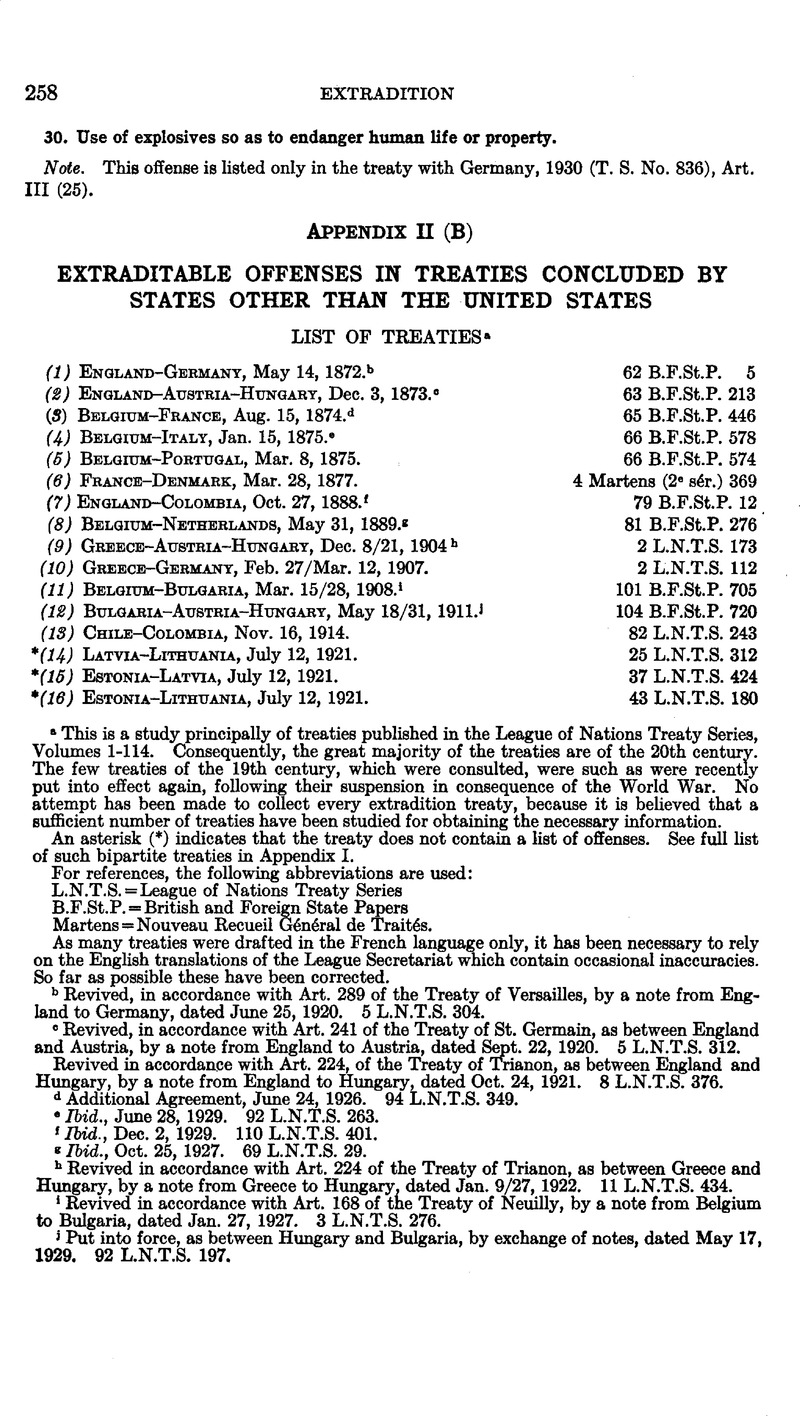No CrossRef data available.
Article contents
Appendix II (B) Extraditable Offenses in Treaties Concluded by States Other than the United States
Published online by Cambridge University Press: 12 April 2017
Abstract

- Type
- Extradition
- Information
- American Journal of International Law , Volume 29 , Issue S1: Supplement. Research in International Law Parts I & II , 1935 , pp. 258 - 274
- Copyright
- Copyright © American Society of International Law 1935
References
page 258 note a This is a study principally of treaties published in the League of Nations Treaty Series, Volumes 1-114. Consequently, the great majority of the treaties are of the 20th century. The few treaties of the 19th century, which were consulted, were such as were recently put into effect again, following their suspension in consequence of the World War. No attempt has been made to collect every extradition treaty, because it is believed that a sufficient number of treaties have been studied for obtaining the necessary information. An asterisk (*) indicates that the treaty does not contain a list of offenses. See full list of such bipartite treaties in Appendix I. For references, the following abbreviations are used: L.N.T.S.=League of Nations Treaty Series B.F.St.P. = British and Foreign State Papers Martens=Nouveau Recueil General de Traites. As many treaties were drafted in the French language only, it has been necessary to rely on the English translations of the League Secretariat which contain occasional inaccuracies. So far as possible these have been corrected.
page 258 note b Revived, in accordance with Art. 289 of the Treaty of Versailles, by a note from England to Germany, dated June 25, 1920. 5 L.N.T.S. 304.
page 258 note c Revived, in accordance with Art. 241 of the Treaty of St. Germain, as between England and Austria, by a note from England to Austria, dated Sept. 22, 1920. 5 L.N.T.S. 312. Revived in accordance with Art. 224, of the Treaty of Trianon, as between England and Hungary, by a note from England to Hungary, dated Oct. 24, 1921. 8 L.N.T.S. 376.
page 258 note d Additional Agreement, June 24, 1926. 94 L.N.T.S. 349.
page 258 note e Ibid., June 28, 1929. 92 L.N.T.S. 263.
page 258 note f Ibid., Dec. 2, 1929. 110 L.N.T.S. 401.
page 258 note g Ibid., Oct. 25, 1927. 69 L.N.T.S. 29.
page 258 note h Revived in accordance with Art. 224 of the Treaty of Trianon, as between Greece and Hungary, by a note from Greece to Hungary, dated Jan. 9/27, 1922. 11 L.N.T.S. 434.
page 258 note i Revived in accordance with Art. 168 of the Treaty of Neuilly, by a note from Belgium to Bulgaria, dated Jan. 27, 1927. 3 L.N.T.S. 276.
page 258 note j Put into force, as between Hungary and Bulgaria, by exchange of notes, dated May 17, 1929. 92 L.N.T.S. 197.
page 259 note a Unless otherwise specified in the Note following each extraditable offense, such offense is enumerated in every treaty contained in the above list,—except, of course, those treaties which do not contain a list of extraditable offenses.
In the Notes the treaties are referred to by the names of the contracting parties; the date of and reference to the treaty is not given. In order to facilitate the location of reference, each treaty in the above list is followed by its number in italic. Unless otherwise indicated in the Notes, the list of extraditable offenses is contained in Article 2 of the treaty referred to.
page 262 note a This provision only in Estonia-Sweden (59).
page 265 note a In the treaties of England with Latvia (27), Estonia (84), Lithuania (89), Albania (43), Colombia (7), in all Art. 2 (6) “Indecent assault” is listed separately.
page 269 note a In Chile-Colombia (13), the following two hundred offenses are listed separately: “Misappropriation of funds, property, documents, and all kinds of public or private title-deeds, committed by persons entrusted with their custody, or fraudulent abstraction of the above by partners or persons employed in the firm or establishment in which the act was committed”.
“Embezzlement or malversation of public funds by officials or public trustees.”




